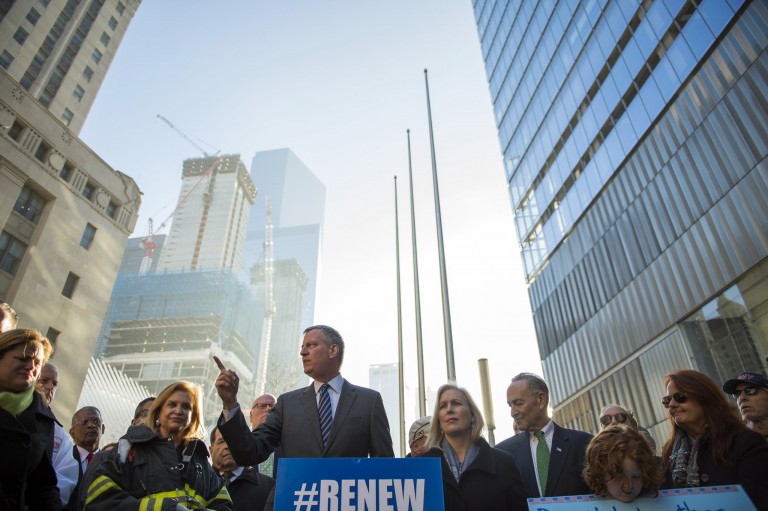PHOTO: Mayor de Blasio last week joined elected officials on city, state, and federal levels, and Sept. 11 first responders in pressuring Congress to renew the Zadroga Act. Photo Courtesy of Ed Reed/Mayoral Photography Unit
The James Zadroga 9/11 Health and Compensation Reauthorization Act, like so many pieces of legislation in recent years, is in political limbo in the nation’s capital.
Despite efforts spearheaded by survivors, first responders, New York elected officials, and even celebrities, as of Wednesday, the House of Representatives still has not budged on what some have characterized as common-sense governing.
The Zadroga Act, passed by Congress in 2010, helped ensure proper monitoring and treatment for thousands of men, women and children that face potential life-threatening health effects due to the toxins released at Ground Zero in the aftermath of the Sept. 11 terrorist attacks.
Two of the Zadroga bill’s critical programs—the World Trade Center Health Program and the September 11th Victim Compensation Fund—are set to expire in September 2015 and October 2016.
“We once were able to get support for these 9/11 first responders and survivors, but it was not a permanent solution,” said John Feal, a U.S. Army veteran and demolition expert who worked at Ground Zero. “I have since met people from across the nation who believe America’s elected officials have the moral responsibility to serve and protect their constituents with a permanent extension of this Act. It’s up to us to ensure the 9/11 responders and victims are supported after they sacrificed everything.”
The Reauthorization Act is built on six key pillars: continue the World Trade Center Health Program; continue the September 11th Victim Compensation Fund; make the programs permanent; continue New York City’s cost share; continue to research new conditions.
The World Trade Center Health Program administered by NIOSH would continue medical monitoring for 9/11-related illnesses for over 62,000 9/11 first responders and treatment for over 8,475 injured 9/11 survivors. Over 33,000 responders and survivors have at least one or more medical conditions as a result of their 9/11 exposure. Most of these conditions require chronic care. These conditions include severe respiratory diseases, chronic sinus problems, and psychological conditions such as PTSD. Over 4,385 incidences of WTC-related 9/11 cancers have been certified in program participants, including over 950 among people working for the NYC Fire Department, and more are expected.
Under the bill, the Victim Compensation Fund, which is scheduled to close on Oct. 3, 2016, would remain open and be fully funded to provide compensation for economic damages and loss for responders and survivors who were injured by exposure to the toxins at Ground Zero.
Many Sept. 11 responders and survivors have chronic WTC-related illnesses requiring long term care. Some will have delayed onset of illnesses especially cancers due to 9/11 exposures. They will continue to need medical care and compensation. Making the programs permanent would be similar to legislation that was enacted providing medical and compensation benefits for workers at our nuclear facilities.
And New York City has pledged to continue to contribute 10 percent matching cost share of the total costs of the World Trade Center Health Program.
If Zadroga is not renewed and extended, the programs will end. The legislation currently has 240 bipartisan sponsors in the House and 62 sponsors in the Senate.
By Michael V. Cusenza michael@theforumnewsgroup.com

